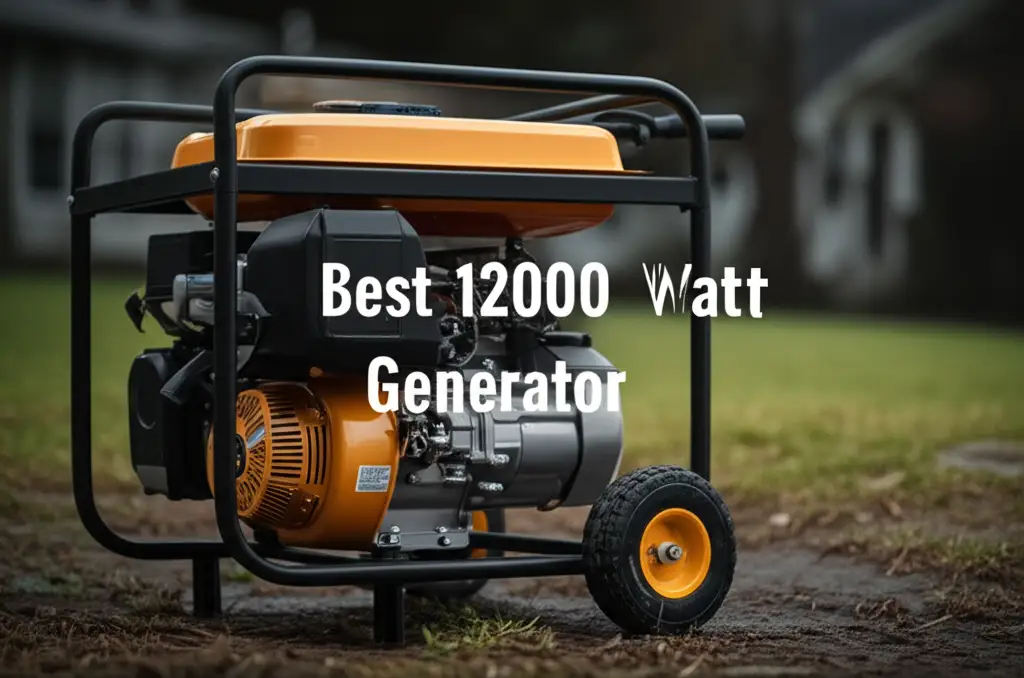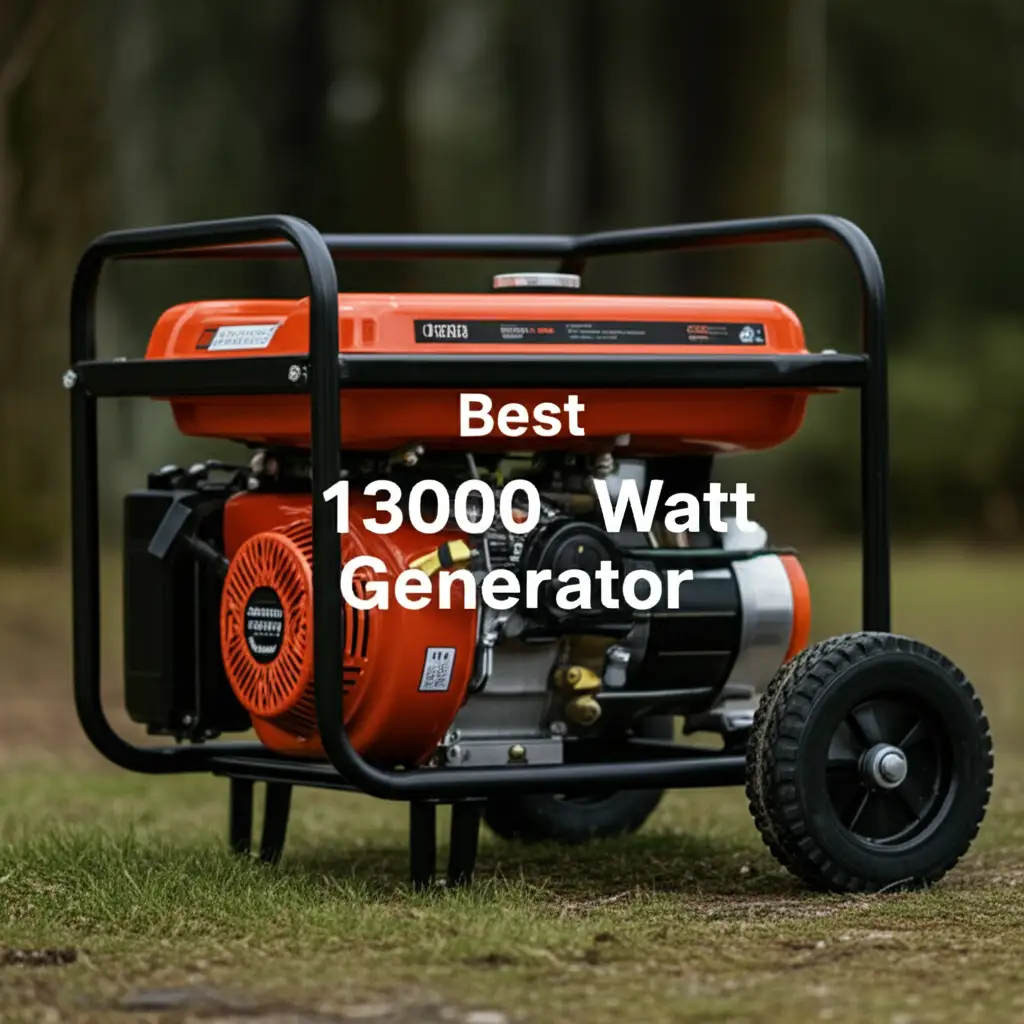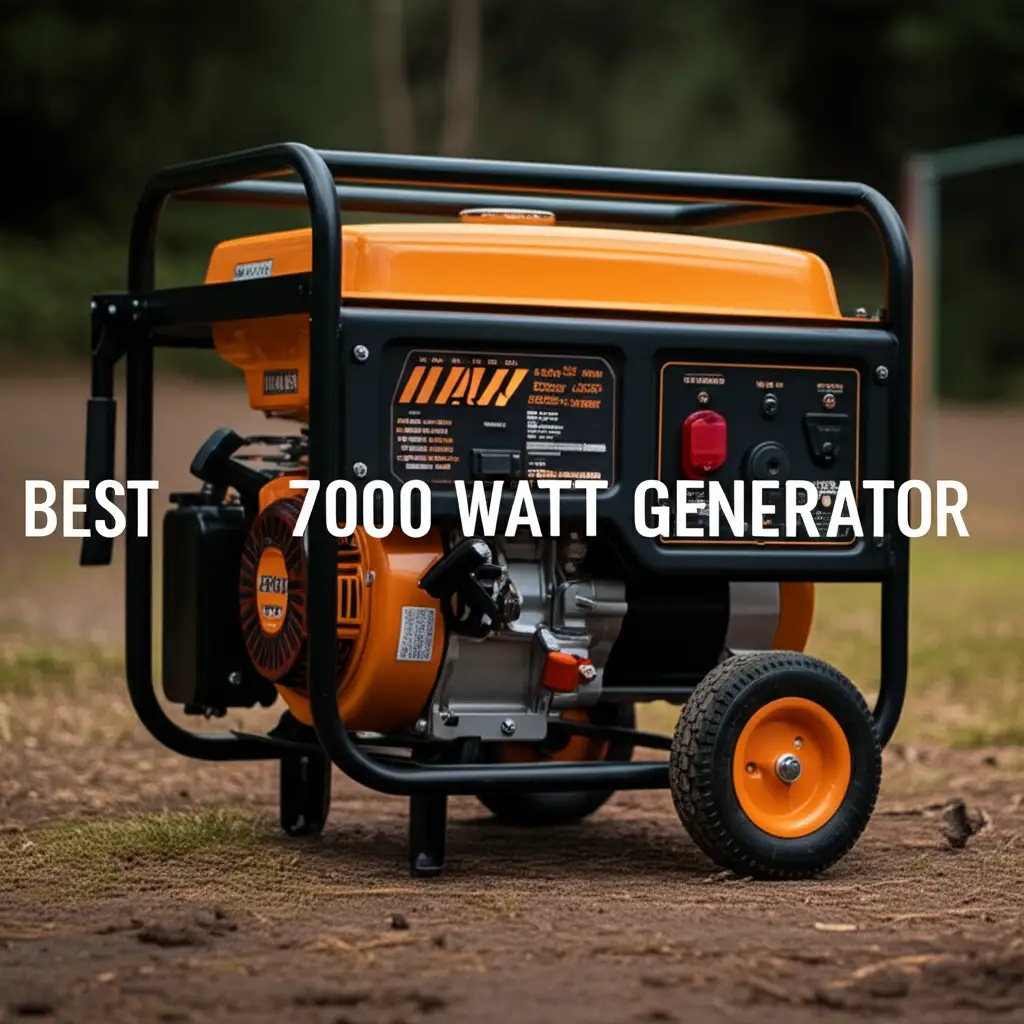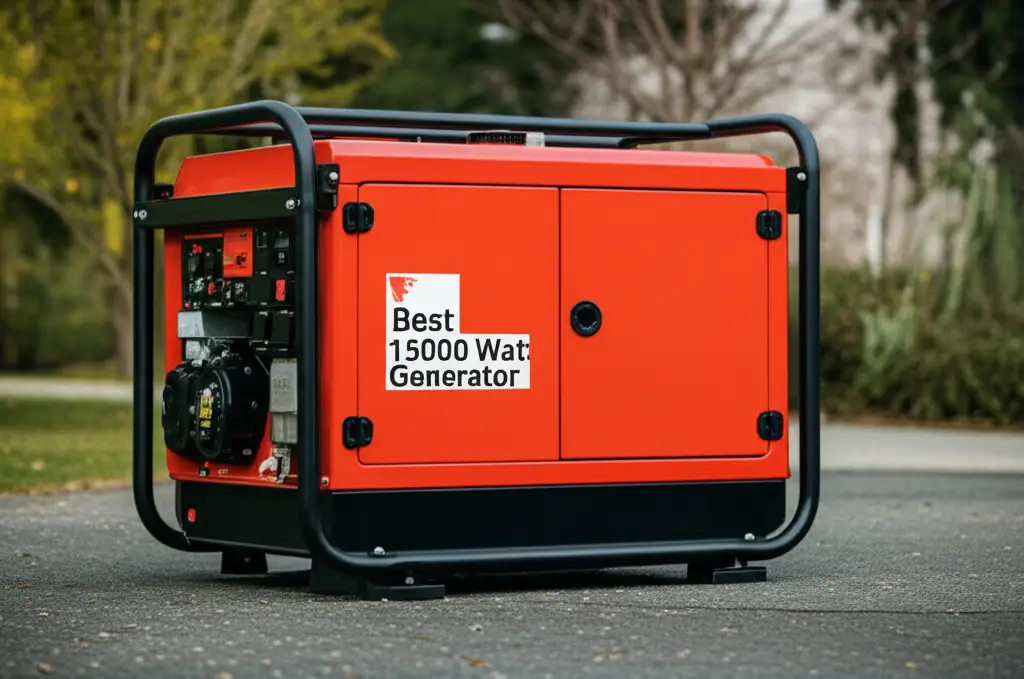· Elira Thomsen · Power Solutions · 15 min read
Best 12000 Watt Generator

Finding the Best 12000 Watt Generator for Your Needs
Losing power can disrupt daily life. Imagine your lights off, refrigerator warm, and essential devices dead. This is where a reliable generator becomes vital. Specifically, a 12000 watt generator offers significant power for home backup, job sites, and other substantial energy needs.
Choosing the best 12000 watt generator requires understanding various features and safety protocols. This guide explores why a 12000-watt unit might be perfect for you. We will look at key features, safety tips, top brands, and maintenance needs. My goal is to help you select a generator that provides dependable power.
Takeaway
- Assess Your Power Needs: List essential appliances and tools to determine required running and starting watts.
- Prioritize Safety Features: Look for CO shut-off, low-oil shut-off, and proper grounding.
- Consider Fuel Type: Dual-fuel models offer versatility; gasoline is common, propane burns cleaner.
- Evaluate Noise Levels: Lower decibel ratings mean quieter operation, important for residential areas.
- Plan for Installation: Decide between portable use or professional transfer switch installation for home backup.
A 12000 watt generator offers robust power for significant energy demands. The best choice depends on your specific use, budget, and desired features like fuel type, noise level, and portability. Top models provide reliable backup for homes and power for large tools on job sites.
Why Choose a 12000 Watt Generator?
A 12000 watt generator provides substantial power. This level of wattage supports many needs. It is often the right size for whole-home backup power. It also works well for large construction sites.
These generators handle high starting loads. They can power major appliances at once. Think about your refrigerator, oven, and even your air conditioning unit. A 12000 watt model can manage these items.
Powering Your Home During Outages
Power outages cause inconvenience. A 12000 watt generator keeps your home running smoothly. It ensures your lights stay on. Your food remains cold in the freezer.
You can run multiple major appliances simultaneously. This brings peace of mind during storms or grid failures. Many people find this power level provides true comfort.
Ideal for Job Sites and RVs
Construction sites demand high power. Large tools like saws, drills, and compressors need significant wattage. A 12000 watt generator meets these demands. It helps keep projects on schedule.
Large RVs also benefit from such power. They can run multiple air conditioners, microwaves, and entertainment systems. This generator size supports a comfortable outdoor experience. You have plenty of power for your road trips.
Key Features to Look for in a 12000 Watt Generator
When selecting a 12000 watt generator, specific features are important. These features improve performance and user experience. They also ensure the generator meets your specific needs. Understanding them helps you make a smart choice.
Engine Type and Reliability
The engine is the heart of any generator. Look for a robust engine, often an OHV (Overhead Valve) design. OHV engines run more efficiently. They also last longer. A strong engine ensures reliable power generation for years.
Consider engine displacement, measured in cubic centimeters (cc). A higher cc usually means more power and durability. Reliable engines start easily and maintain steady power output.
Starting Methods
Generators offer different ways to start. Manual recoil start requires pulling a cord. Electric start uses a key or button. This is much easier to use. Remote start allows you to turn the generator on from a distance.
Remote start is very convenient during bad weather. It also saves you a trip outside. Look for a generator with multiple starting options for flexibility. This gives you peace of mind.
Fuel Type Versatility
Generators run on various fuels. Gasoline is common and widely available. Propane burns cleaner and stores longer. Dual-fuel generators use both gasoline and propane. This offers great flexibility.
Some models can run on natural gas. Natural gas connects directly to your home’s supply. This removes the need for refueling. Choose a fuel type that fits your storage and availability needs.
Run Time and Fuel Efficiency
A generator’s run time indicates how long it operates on a full tank. This is important during extended outages. Fuel efficiency affects operating costs. Generators with larger fuel tanks often offer longer run times.
Inverter technology improves fuel efficiency. It also provides cleaner power. Look for a model that balances run time with fuel consumption. This ensures you have power when you need it.
Noise Level
Generators produce noise. This is measured in decibels (dB). A lower decibel rating means quieter operation. For residential areas, quieter models are better. Noise levels often range from 60 dB to 80 dB.
Inverter generators are generally quieter than traditional open-frame models. Consider where you will place the generator. Choose a noise level you can tolerate for extended periods.
Safety First: Operating Your 12000 Watt Generator
Operating any generator requires strict safety measures. A 12000 watt generator produces significant power. Improper use can cause serious hazards. These include carbon monoxide poisoning, electric shock, and fire. Following safety guidelines protects you and your family.
Carbon Monoxide Dangers
Generators produce carbon monoxide (CO) exhaust. This gas is colorless and odorless. It can be deadly. Always run your generator outdoors. Place it far from windows, doors, and vents.
Install battery-operated CO detectors inside your home. Check their batteries regularly. This simple step can save lives. Never operate a generator in an enclosed space. This includes garages, sheds, or basements.
Proper Ventilation and Placement
Good ventilation is critical. Position the generator in an open area. Make sure exhaust fumes blow away from occupied buildings. Manufacturers usually recommend a specific distance from your home.
Follow these distance guidelines. Clear the area around the generator. Do not block air vents on the unit. Proper airflow helps the generator run efficiently. It also prevents overheating.
Transfer Switches for Home Backup
Connecting a generator directly to your home’s electrical system without a transfer switch is dangerous. It can cause back-feed. This sends electricity back to the utility lines. Utility workers can be injured or killed.
A transfer switch safely disconnects your home from the utility grid. It then connects your home to the generator. Always have a qualified electrician install a transfer switch. This ensures safe power transfer.
Grounding Your Generator
Generators need proper grounding. Grounding protects against electric shock. It directs stray electricity into the earth. Many portable generators have a bonded neutral. This means the neutral wire is connected to the frame.
Always follow the manufacturer’s grounding instructions. For home backup, the transfer switch system usually handles grounding. If using extension cords, ensure they are heavy-duty and rated for outdoor use. Regularly inspect cords for damage.
Top Brands and Models: Best 12000 Watt Generators
Many companies make quality generators. Certain brands stand out for their reliability and features. When looking for the best 12000 watt generator, you will encounter these names often. I have seen many people trust these brands for their power needs.
Champion Power Equipment
Champion generators are known for their value. They offer a good balance of features and price. Many Champion 12000-watt models include dual-fuel capability. This gives you flexibility in fuel choice.
Their engines are reliable. They often come with electric start for easy operation. Champion also focuses on user-friendly designs. This makes them popular for both homeowners and professionals.
DuroMax Generators
DuroMax is another strong contender. They build powerful and durable generators. Their 12000-watt models are often called “beast” generators. They handle tough jobs with ease.
DuroMax units feature strong frames and robust engines. Many offer dual-fuel options. They are popular for construction sites and heavy-duty home backup. You can rely on them for consistent power.
Generac Generators
Generac is a leader in generator technology. They make both portable and standby units. Their 12000-watt portable generators are well-engineered. They focus on reliability and long-term performance.
Generac units often have advanced features. These include automatic CO shut-off. Their standby generators can start automatically during outages. This provides seamless power to your home.
Westinghouse Generators
Westinghouse has a long history in power solutions. Their generators combine innovation with dependability. A Westinghouse 12000-watt generator often features quiet operation. They also have excellent fuel efficiency.
Many models include remote start and multiple outlets. Westinghouse generators are a popular choice for home backup. They provide a lot of power in a well-designed package.
Generator Maintenance: Keeping Your 12000 Watt Unit Ready
Regular maintenance ensures your 12000 watt generator works when you need it most. Generators are complex machines. Like a car, they need routine care. Neglecting maintenance can lead to breakdowns. It can also shorten the generator’s lifespan.
I always tell people that a little prevention goes a long way. This makes sure your power source is ready for an emergency.
Oil Changes and Fluid Checks
Engine oil lubricates moving parts. It keeps the engine cool. Change the oil according to the manufacturer’s schedule. This is usually after the first 20-30 hours, then every 50-100 hours. Always use the recommended type and weight of oil.
Check the oil level before each use. Also, check coolant levels if your generator has a liquid-cooled engine. Ensure all fluid caps are secure.
Spark Plug and Air Filter Inspection
The spark plug creates the spark for combustion. A dirty or worn spark plug causes poor engine performance. Inspect it regularly. Clean or replace it as needed. This simple task can greatly improve engine starting and running.
The air filter prevents dirt from entering the engine. A clogged filter restricts airflow. This can reduce power and increase fuel consumption. Clean or replace the air filter frequently. Cleaning air vents in your home also keeps air flowing well, just like your generator needs clean air.
Fuel Storage and Stabilization
Fuel can degrade over time. This causes engine problems. Use a fuel stabilizer if you store gasoline for more than a month. This prevents gumming and corrosion. For propane, ensure tanks are stored safely.
Run the generator for a short time every few months. This keeps the carburetor fresh. It also circulates fluids. This “exercise” helps the generator stay in prime condition.
Battery Maintenance
Many 12000 watt generators have an electric start. They use a battery. Check the battery terminals for corrosion. Keep them clean and tight. If it is a lead-acid battery, check the water levels.
Use a battery tender during storage. This keeps the battery charged. A fully charged battery ensures your generator starts reliably. A dead battery means no electric start, which can be frustrating during an outage.
General Cleaning
Keep your generator clean. Remove dust, dirt, and debris. This helps prevent overheating. It also allows for easier inspection. A clean generator runs more efficiently.
For example, just like you would clean a ceiling or other parts of your home, keeping the generator exterior clean is part of good upkeep. Ensure vents are clear. A little cleaning goes a long way.
Understanding Generator Watts and Amps
Choosing the right generator means understanding power measurements. Watts and amps are key terms. They describe how much power a generator can produce and how much an appliance needs. Knowing these helps you size your generator correctly. I find that this knowledge prevents common mistakes.
Running Watts vs. Starting Watts
Generators list two wattages: running watts and starting watts. Running watts is the continuous power a generator can supply. This is the power an appliance needs to operate normally.
Starting watts is the surge of power an appliance needs at startup. Electric motors, like those in refrigerators or air conditioners, require extra power for a brief moment to get going. This starting wattage can be two to three times higher than the running wattage. Always ensure your generator’s starting watts capacity is enough for your highest surge appliance.
Calculating Your Power Needs
Make a list of all appliances you want to power. Note their running watts and starting watts. These numbers are usually on the appliance label or in its manual. Add up the running watts for all items you plan to run simultaneously. This gives you your total running watts requirement.
Then, identify the appliance with the highest starting wattage. Add this highest starting wattage to your total running watts. This sum is your minimum required starting wattage for the generator. For instance, if you want to power your refrigerator, its starting watts are crucial. For items like a dishwasher, consider both running and starting loads.
Amps and Volts Explained
Amps (amperes) measure the flow of electricity. Volts (voltage) measure the electrical pressure. Watts are calculated by multiplying amps by volts (Watts = Amps x Volts). Most homes use 120V and 240V circuits.
A 12000-watt generator can deliver different amp outputs depending on the voltage. For example, at 240V, 12000 watts means 50 amps (12000 / 240 = 50). At 120V, it means 100 amps (12000 / 120 = 100). Understand the voltage requirements of your appliances. Ensure your generator has the correct outlets.
Power Factor
The power factor is a measure of how efficiently electrical power is converted into useful work. It ranges from 0 to 1. Most appliances have a power factor close to 1 for resistive loads (like heaters). Motors have a lower power factor.
Generators are usually rated at a certain power factor, often 0.8. This means a 12000-watt generator might have a slightly higher apparent power (kVA) rating. Focus on the watt rating for calculating what appliances it can power.
Portable vs. Standby 12000 Watt Generators
When considering a 12000 watt generator, a key decision is between portable and standby models. Both types offer significant power. However, they serve different purposes and have distinct advantages. I have seen people choose one over the other based on their specific needs.
Portable 12000 Watt Generators
Portable generators are versatile. You can move them to different locations. They often come with wheels and handles for easier transport. These generators are suitable for multiple uses. You can use them for home backup, camping, or job sites.
They require manual setup and refueling. You must start them when power goes out. They connect to appliances via extension cords or a manual transfer switch. Portable models are generally less expensive upfront. They offer great flexibility for varied power needs.
Standby 12000 Watt Generators
Standby generators offer ultimate convenience. They are permanently installed outside your home. They connect directly to your home’s electrical system. They monitor the utility power. When an outage occurs, they start automatically.
This seamless power transfer means you do not need to do anything. Standby units often run on natural gas or propane from a fixed supply. This eliminates the need for refueling. They are more expensive to buy and install. However, they provide unparalleled peace of mind.
Deciding Which Is Right for You
Consider your primary need for power. If you need power for multiple locations or occasional home backup, a portable unit works well. If continuous, automatic power during outages is your priority, a standby unit is the better choice.
Think about your budget. Portable generators are a lower initial investment. Standby generators require professional installation and a higher upfront cost. Evaluate the frequency and duration of power outages in your area. This will help you decide.
FAQ Section
What can a 12000 watt generator power?
A 12000 watt generator can power most essential home appliances simultaneously. This includes refrigerators, freezers, lights, and multiple small electronics. It can often run central air conditioning units, electric ovens, or well pumps. This makes it ideal for whole-home backup during outages or for running heavy tools on a job site.
How long can a 12000 watt generator run?
The run time of a 12000 watt generator depends on its fuel tank size and the load it is powering. On a typical 8-gallon gasoline tank, it might run for 8-12 hours at half load. Heavy loads will reduce run time significantly. Propane models might offer different run times depending on tank size and pressure.
Are 12000 watt generators loud?
Most 12000 watt generators are relatively loud. Their noise levels often range from 70 to 80 decibels (dB) at 23 feet. This is comparable to a loud vacuum cleaner or a busy street. Some models, especially inverter generators, can be quieter. Look for models with noise reduction features if sound is a concern.
Do I need a transfer switch for a 12000 watt generator?
Yes, for home backup, you absolutely need a transfer switch. A transfer switch safely connects your generator to your home’s electrical system. It prevents dangerous back-feed into the utility grid, which can harm utility workers. It also protects your appliances from power surges. Always have a qualified electrician install it.
How much does a 12000 watt generator cost?
The cost of a 12000 watt generator varies widely. Portable models can range from $1,000 to $3,000, depending on features and brand. Standby generators of this wattage can cost $3,000 to $6,000 or more for the unit itself. Installation costs for standby units add significantly to the total price, often ranging from $1,500 to $5,000.
Conclusion
Choosing the best 12000 watt generator is a significant investment. It brings great peace of mind, knowing you have reliable power when needed. We have explored the benefits of these powerful units, from home backup to job site operations. Understanding features like engine type, fuel options, and noise levels helps you make an informed decision.
Safety always comes first when operating any generator. Proper placement, ventilation, and the use of a transfer switch are essential. Regular maintenance ensures your 12000 watt generator remains ready for any emergency. By considering your specific needs and applying these guidelines, you can find the perfect generator. Take action today to secure your power future. Research specific models and prepare for reliable energy.
- 12000 Watt Generator
- Home Backup Generator
- Portable Generator
- Generator Buying Guide
- Emergency Power
- Power Outage
- Generator Features





